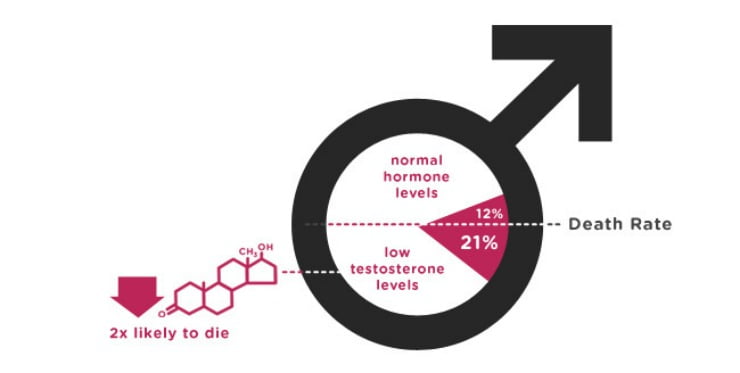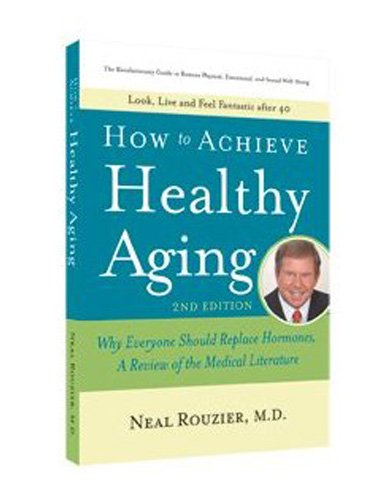
Should you consider Testosterone Replacement Therapy?
Last week I posted about bioidentical hormones for women, and included comments from Elizabeth, who has been trained in bioidentical hormone replacement therapy (BHRT). Click here to read that post: Is Bioidentical Hormone Replacement Therapy Safe? Plus My Menopause Update and Breast Cancer Rants.
Actually, what you really should do is read the post that came before that one: Are Extreme Menopause Symptoms Normal? Should We Embrace Our Muffin Top?
(One more you might like: The Pain of Low Libido.)
Today Elizabeth shares her thoughts on BHRT for men.
Also, as in last week's post, she has agreed to answer the questions that come in via the comments. So feel free to share your comments or ask questions below, and in a week or two I'm going to compile the Q & A's from both posts into one new post.
My typical but very necessary disclaimer:
Don't blindly follow what you read here or anywhere, do your own research, talk to your own trusted health professional, and use common sense.
As with every issue, there are always those who say whatever it is is safe, or at least that the benefits outweigh the risks, and others who say NOPE, the risks are too great. I'll let you hear from Elizabeth and you can decide how you will move forward.
Andropause
Andropause is male menopause, characterized by a drop in testosterone. There are specific indicators that this hormone is beginning to decline, I'm sure you can guess what some of them are…
This part of the conversation began when I asked Elizabeth a question:
 Me: I know you recommend BHRT for women, do you also recommend men being checked for hormone deficiencies, as Rouzier suggested in the book, How to Achieve Healthy Aging by Dr. Rouzier, to guard against chronic disease, and if so, when?
Me: I know you recommend BHRT for women, do you also recommend men being checked for hormone deficiencies, as Rouzier suggested in the book, How to Achieve Healthy Aging by Dr. Rouzier, to guard against chronic disease, and if so, when?
My Hubs shows no signs of dropping testosterone (thankfully!), but obviously I assume that will happen eventually, and is THAT the time that he should be checked, or could there be stuff going on before that which could mean he's at increased risk for chronic disease?
Elizabeth: Yes, men also lose hormones around the same age as women and when that happens they are at increased risk for most of the degenerative diseases . We check hormone levels in men as well and replace accordingly. By the time a man is no longer having morning erections or is experiencing erectile dysfunction, his testosterone is already quite low – it is a good idea to start checking the male hormones well before that time, it's also good to get baseline levels while hormones are still normal (around age 30 — after 30 hormones start to decline), otherwise testing can begin anytime he starts feeling increased fatigue, weakness, depression, decreased energy, or a lowered sex drive – usually sometime in their 40s.
Me: Sadly, from what I hear from friends and readers, this issue is fairly common, and I would think it would be a big challenge in a marriage. Not just for the obvious reasons, but because for Kent and I, since this aspect of our relationship is so healthy, it really does bring us closer (as God designed it to) and smooths out a lot of other bumps — like when he's on my nerves, or vice versa, it gets us over things more quickly! It just makes everything else seem like not that big a deal and we can laugh things off easier. It makes me sad for couples who don't have this connection.
Elizabeth: The truth is, sexual intimacy in marriage is an extremely important aspect of the relationship for both parties and should not be neglected and allowed to wither and die. Unfortunately that's what happens far too frequently. Having inadequate levels of hormones is one thing that doesn't need to be a complicating factor in a marriage.
Me: My theory is that this problem is increasing in men nowadays (and at younger ages!), due to the massive amounts of soda, processed/boxed foods, fast food, etc., that most men are consuming (not just men, obviously) — all of that can't be good for libido.
Elizabeth: One study showed a 17% decline in average testosterone levels in men between 1987 and 2004. It is likely that environmental factors like diet and exposure to toxins are resulting in this serious decline in men's hormones.
As with women's hormones, we replace men's hormones to optimal (youthful) levels according to the blood tests. It is important to distinguish between “optimal” levels and “normal” levels in hormone replacement therapy. For example, a 50 year old man can have a free testosterone level that is “normal” for a 50 year old male and yet have many symptoms of low testosterone or andropause. When we replace his testosterone to “optimal” youthful levels those symptoms disappear, and his risk for many of the degenerative diseases of aging is also markedly decreased.
Me: I do wonder, though, for the average guy with a fairly good diet, is it NOT just “normal” for a man's testosterone levels to decline with age? Isn't that just part of natural aging?
Elizabeth: Yes, it is “normal” for hormone levels of men (and women) to decline with age – it is also “normal” to get the degenerative diseases of aging and die after we lose our fertility. Since we are living well past our age of fertility (or our usefulness from a biological perspective), then presumably we want to remain as healthy as possible for our remaining years, which is the whole point of maintaining youthful levels of hormones.
The notion that we should age “naturally” is a different subject entirely and is a philosophical discussion rather than a medical one. I don't think anyone is trying to live forever, but we are certainly trying to have good health for as long as possible. It's about adding life to our years rather than years to our life.
For example, I have a very strong family history of severe osteoporosis. By the time my mother was my age (62) she had already lost 2 inches of height and had a compression fracture of one of the vertebrae in her back. She is now 86 and can no longer stand up straight and has lost 5 inches of height due to osteoporosis, it is a very debilitating disease. I have been doing BHRT for over 10 years and have no signs of osteoporosis at this point, my quality of life has improved tremendously and for that I am very thankful. I will never be without hormones!
Me: Have you seen this NYT article? Weighing Testosterone's Benefits and Risks — this shows more of the riskier side of testosterone, however it was obvious they weren't talking here about bioidentical hormones!
Elizabeth: Yes, here is an article Dr.Rouzier wrote in response to some recent negative publicity about testosterone therapy as a result of a widely reported study showing negative cardiovascular consequences, and as mentioned in the NYT article you linked to.
There are 40 years of studies (find the links in the above article) and solid scientific evidence supporting the use of hormone replacement therapy for men to improve long-term health, quality of life and sense of well-being.
This is a really important subject for men's health – they need to know the facts about hormone replacement and specifically testosterone.
The world's leading experts in field, including Rouzier and Morgentaler, have been concerned that the now discredited study is doing to men's HRT what the WHI did to women's hormone replacement, which caused millions of women to suddenly stop taking their hormones (instead of switching from synthetic hormones to bioidentical ones). This is why they have come out so strongly against the study and its findings, in the hope of shedding some rational scientific light on the matter.
Okay readers, what do you think?
More information for you to ponder:
- The main risks related to testosterone replacement are mostly related to prostate cancer, but according to the How to Achieve Healthy Aging by Dr. Rouzier book, it doesn't cause it, but could exacerbate it if you already have it.
- However there are risks to just accepting the low testosterone levels, too: Low testosterone linked to heightened risk of early death
- Note this chart (from this study) with Testosterone Levels by Age and a visual picture of the normal steady decline:

THANK you all who like and share this post with others to hopefully help them on their journey through menopause OR andropause!
And don't forget to leave your comments and questions below. 🙂
- So you can hear another side, and from someone I trust: Click here to read what Joette thinks of bio-identical hormones. Elizabeth's comments on Joette's article: “My response to homeopathy is the same as my response to any other therapy – check the hormone levels! If they are optimal, then the therapy is fine, if they are not, then you are not receiving proper protection even though there might be some symptomatic relief.“
- Check out my FAVORITE gadget to help my HOT FLASHES!!!
- And here's one more: a wireless remote control that I use for flipping on my fan at night so I don't have to get up when I'm having another flash!
 Complete index of natural remedies — look to see if there's help for whatever YOU are struggling with.
Complete index of natural remedies — look to see if there's help for whatever YOU are struggling with.- Complete index of posts on hormones and feminine issues.




Elaine says
Hi Kelly~ I have known several folks that have gone the bio-identical route but just never had a warm fuzzy about it. I have read several things and couldn’t put my finger on them the other day when this post came out but just came across one by Joette Calabrese (who I LOVE!) … you might find this interesting. Hope all is well! https://joettecalabrese.com/blog/bio-identical-hormones-homeopathy/
KitchenKop says
Thanks Elaine, I’ll address this in my upcoming post where I wrap up everything I’ve learned and have a big Q & A.
Kel
Carmen says
I found the information in this article of interest on this topic: Vitamin A: The Fortgotten BodyBuilding Nutrient
https://www.westonaprice.org/health-topics/vitamin-a-the-forgotten-bodybuilding-nutrient/
Just like for women, Vitamin A is necessary for all hormonal conversion steps. Article starts off talking about Vitamin A and Testosterone.
KitchenKop says
Carmen, great find! This is definitely something to look into and it may be smart to go this route first either way, but *especially* those who can’t afford the bios. Thanks!
Kelly
NHWCenter says
Unfortunately, people see BHT as the panacea for healthy aging but fact its not. Hormones are NOT supplements but many people treat them as if they are. I have a lot of success in assisting men and women (and teens) with hormone balance. Using hormones increases other health issues and testosterone shots are the worst! I think this post needs to include the downside of focusing on putting more hormones into the body. Yes, men and women need hormone balancing but diet and lifestyle has a lot to do with the body’s ability to produce hormones. Pushing in more hormones without supporting other areas of the body is like putting jet fuel in a compact car. Yes, you can get speed and power but how long will this engine last with improper fuel?
busymomof10 says
This was very interesting! Thanks for sharing it! It especially interested me because I was doing some research not too long ago and discovered that high blood sugar levels INCREASE testosterone in women and DECREASE testosterone in men. Maybe that is why our modern diets which are carb/sugar heavy are causing more men to have issues with this. What prompted my research was the fact that two men I know have INCREASED their testosterone levels from using Plexus Slim, which balances blood sugar levels in the body. I wanted to understand WHY that was the case. thanks again for sharing this post.
DaraW says
You might be interested in this book: https://www.amazon.com/The-Natural-Testosterone-Plan-Sexual/dp/1594771685
Kristy A. says
Hi Kelly,
So glad you wrote this post. My husband is 46 and has been on testosterone shots for about 2 years now. The Dr. said his levels were the lowest he has seen. He gets a shot every 2weeks. He has tried going less but symptoms keep him going back sooner.
His symptoms were never lack of sex drive, more tiredness achey joints and muscles.
My question is could this be from a vasectomy he had several years ago (regretfully)?
I’m really worried about him getting these shots and would love some advise on more natural replacements. Thank you,
Kristy
KitchenKop says
Kristy,
Is he on bioidentical testosterone?
Kelly
Susan says
Kristy- both my husband and I began to see changes in him a couple of years after his vasectomy and could never really understand what was going on with him until several years later I read one of Suzanne Somers’ books and realized his testosterone was crashing. Does one situation have to do with another? I don’t know and have not really read anything that confirms that. But I always wonder…..
As my husband’s testosterone became lower and lower, it became more difficult for him to maintain an erection, he was always tired even though he was getting 8 or 9 hours of sleep per night. He needed naps all the time and one evening he even started falling asleep when we were having dinner! Right at the table, sitting up and chewing!! He also was losing his muscle mass and his once sturdy shoulders were looking more and more feminine. His estrogen levels were off the charts and his testosterone was in the tank.
As far as your question about injectable testosterone, this is what my BHRT doc told us: When she first started my husband on testesterone, she could not get his levels to change much between blood draws. She tried to tweak things every way she could; his levels wouldn’t budge. So she eventually put him on the injections, which she didn’t like to do particularly because they weren’t bioidentical, but they were effective in bringing up his numbers rather quickly. Once his numbers increased, she put him back on bioidentical.
Two years seems like an awfully long time to be on the injections. If he needs testosterone, I would see a doc who specializes in BHRT. The way my doc explained it to us, there is no injectible form of bioidentical testosterone. Ar least there wasn’t 2 years ago when my husband did the injections.
Susan says
Lol! I guess I should have told everyone how he’s doing with the treatment. Once his levels began to even out and his testosterone was finally higher than his estogen, the first thing I noticed was his ability to stay awake all day. Have you ever noticed how grandpa falls asleep the moment he sits in a chair? That was my husband and he was only in his 50’s when he was doing this!
The next thing I noticed was his shoulders began to return. He does physical labor for a living, so it didn’t take long before his shoulders began to fill out again. He also was so much happier! When he was higher in estrogen he would cry all the time…even over commercials. With all that estrogen raging through him he had become a sensitive girl! I called him my girlie-man!! But the day I became really surprised with his results was when we were out eating lunch together, and I noticed that his facial skin had become tighter, plumper and more youthful!! He looked young and he looked manly. Want to see how testosterone keeps a guy looking great? Google Alan Hamel (Suzanne Somers’ husband); this guy is pushing 80 and he looks amazing!
Unfortunately, both my husband and I had to stop using BHRT because the doctor appoinments and constant bloodwork became too expensive for us. The BHRT itself is not too expensive, but the office visits really add up. It ripped us apart to have to stop because we both noticed such a difference, but we just couldn’t afford it any more.
So how is hubby doing now? I saw him crying at a commercial the other day and I noticed he’s gettng sleepy all the time again too. Believe me, as soon as I win the lottery I will get him back to the doctor ASAP!!
Kristy A says
Thank you so much Susan for the reply. That is exactly my husband, falling asleep the minute he hits the recliner. He’s been trying to work out now to keep muscle mass up. He has been on board with changing his eating habits. YEAH! I am going to check into BHRT for him but sadly we will probably find it to expensive too.